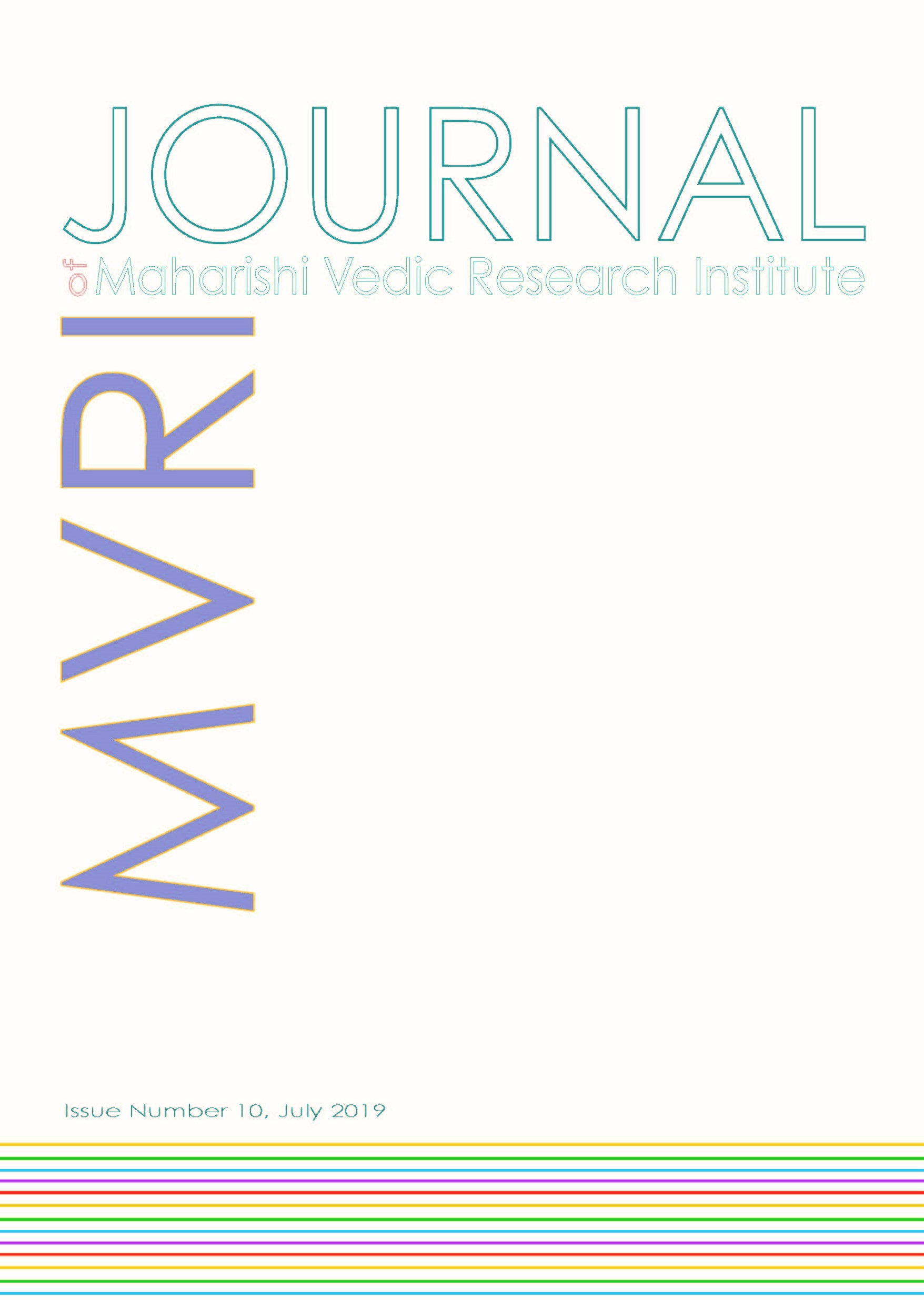JMVRI Issue Number 10

JMVRI Issue Number Ten, as with the previous issue, starts with an article by Maharishi Mahesh Yogi on the supreme value of art and music, a re-printed chapter from The Unmanifest Canvas. The following two papers include a country report on the results of an ongoing educational peace initiative in Bali, and a paper presenting a mixed-methods study of social coherence in Cambodia between 1990 and 2008.
JMVRI Paper 10.1
The Supreme Value of Art and Music
Author: Maharishi Mahesh Yogi
This paper can be downloaded via the following link:
https://www.academia.edu/39776286/The_Supreme_Value_of_Art_and_Music
Citation: Maharishi Mahesh Yogi. (2019). The supreme value of art and music. Journal of Maharishi Vedic Research Institute, 10, 9-20.
Introduction
It is a joy today to inaugurate the field of knowledge and technology of art and music. In inaugurating the supreme field of art and music, we find an opening of the door of all evolution. This inauguration of the field of art and music is to open the door of the supreme value of art and music. Where is the supreme value of art and music? Art is the skillful operation of transformation, the skillful unfoldment of transformation mechanics. Where is music in this? In the transformation of anything, there is change, and change could be uncomfortable. Change could be uncomfortable or change could be comfortable. When change is comfortable, the change is enjoyable, and if it is enjoyable, it has the characteristic of music. Transformation is there, but if the transformation is in the direction of evolution, then it is in the direction of more and more and more and more. Change in the direction of more and more is enjoyable; it is musical.
JMVRI Paper 10.2
Country Report: Bali A Vedic Land: Pulau Dewata, Island of the Gods
Author: Adam Delfiner
This paper can be downloaded via the following link:
https://www.academia.edu/39776300/A_Vedic_land_Pulau_Dewata_Island_of_the_Gods
Citation: Delfiner, A. (2019). A Vedic land: Pulau dewata, island of the gods. Journal of Maharishi Vedic Research Institute, 10, 21-41.
Introduction
Known as Pulau Dewata or Island of the Gods, Bali in Indonesia is unlike anywhere else in the world. Bali is an island-state with a population of 4.2 million people completely dedicated to creating a sustainable, peaceful world. There is something about Bali, even more than the physical, divine beauty of the island itself, something subtler which draws people from around the world to visit Bali; something natural and universal to all human beings: the desire to experience greater peace, more happiness, to come back to the simplicity and boundlessness of the Self—an infinite or Cosmic Self. At the source of this abstract, yet undeniably strong, attraction to Bali, sits the Balinese culture, which is rooted in the knowledge and application of the ancient, eternal Vedas. Every day, all day, the people of Bali hold in their hearts as their highest focus a great expanse of knowledge that brings to light the underlying unity connecting all humans with one another, with nature, and with the divine.
JMVRI Paper 10.3
Socio-Political Violence in Cambodia Between 1990 and 2008: An Explanatory Mixed Methods Study of Social Coherence
Authors: Lee Fergusson and Kenneth L. Cavanaugh
This paper can be downloaded via the following link:
Citation: Fergusson, L., & Cavanaugh, K. L. (2019). Socio-political violence in Cambodia between 1990-2008: An explanatory mixed methods study of social coherence. Journal of Maharishi Vedic Research Institute, 10, 43-126.
Summary
The relationship between individual and group practice of the Transcendental Meditation and TM-Sidhi program and reductions in social stress, tension, and violence has been the topic of systematic exploration since the 1970s in Canada, India, Israel, Lebanon, New Zealand, Norway, the Philippines, Puerto Rico, United Kingdom, and United States. Findings from these quantitative studies have been published in leading international conflict resolution and peace studies journals. However, research in Cambodia has to date only been of a descriptive and qualitative nature with a focus on economic and social variables not violence or crime. The purpose of the present study is therefore to examine sociopolitical violence in Cambodia between January 1990 and December 1992 (the baseline period) and the possible influence of group practice of the Transcendental Meditation and TM-Sidhi program at Maharishi Vedic University (MVU) by 550 undergraduate students beginning in January 1993 through December 2008 (the impact-assessment period). This study uses an explanatory, mixed methods design to examine socio-political violence using time series analysis of machine-coded news reports (quantitative data) and document analysis of national and international media reports, personal statements, and public documents (qualitative data).
Results indicate that beginning in January 1993, when meditating students at MVU began their group practice, a marked downward shift occurred in the trends of socio-political violence and other forms of violent crime in Cambodia, contrary to predicted baseline trends and contrary to widespread community and media expectations. Such a conclusion can be drawn from both the quantitative and qualitative evidence when comparing baseline and impact-assessment periods, suggesting that the observed decline in socio-political violence during this time was associated with an increase in peace, order, and harmony—that is, a rise of social coherence—in the collective consciousness of Cambodia generated by the group of meditating students at MVU.

